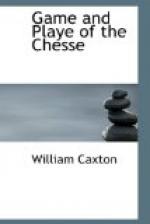The somewhat violent remedy recorded as having been adopted by Demosthenes (p. 103) will remind some readers of a passage in the life of St. Francis of Assisi. “He had given up,” says Mrs. Oliphant, “without hesitation, as would appear, all the indefinite sweetness of youthful hopes. But, nevertheless, he was still young, still a man, with human instincts and wishes, the tenderest nature, and an imagination full of all the warmth and grace of his age and his country. It does not appear that he ever put into words the musings which caught him unawares—the relics of old dreams or soft recollections which now and then would steal into his heart. But one night suddenly he rose from the earthen floor which was his bed, and rushed out into the night in an access of rage and passion and despair. A certain brother who was praying in his cell, peering, wondering, through his little window, saw him heap together seven masses of snow in the clear moonlight. ’Here is thy wife,’ he said to himself; ’these four are thy sons and daughters, the other two are thy servant and thy handmaid; and for all these thou art bound to provide. Make haste, then, and provide clothing for them, lest they perish with cold. But if the care of so many trouble thee, be thou careful to serve our Lord alone.’ Bonaventura, who tells the story, goes on, with the true spirit of a monkish historian, to state how, ’the tempter being vanquished, departed, and the holy man returned victorious to his cell.’ The piteous human yearning that is underneath this wild tale, the sudden access of self-pity and anger, mixed with a strange attempt, not less piteous than the longing, at self-consolation—all the struggle and conflict of emotion which stilled themselves, at least for a moment, by that sudden plunge into the snow, and wild, violent, bodily exertion, are either lost upon the teller of the tale, or perhaps he fears to do his master injustice by revealing any consciousness of the possibility of such thoughts. But it is a very remarkable peculiarity of Francis’s history, that whereas every saint in the Calendar, from Antony downwards, is sometimes troubled with visions of voluptuous delight, only Francis, in his pure dreams, is tempted by the modest joys of wife and children—the most legitimate and tenderest love."[39]
The reader must not expect any historical exactitude or critical spirit from our author. For his purpose a narrative was just as useful whether true or false, but it probably never occurred to him to question the exact truth of any statement that he found written in a book. The murder of Seneca (p. 9) is certainly not the least of the many crimes which stain the memory of Nero, but the circumstances of his death are not exactly described by the mediaeval scribe. Whether the philosopher and former tutor was implicated in the conspiracy of Piso may be doubted, but some ambiguous phrases he had used were reported to the Emeror, whose messenger demanded an explanation of their meaning.




